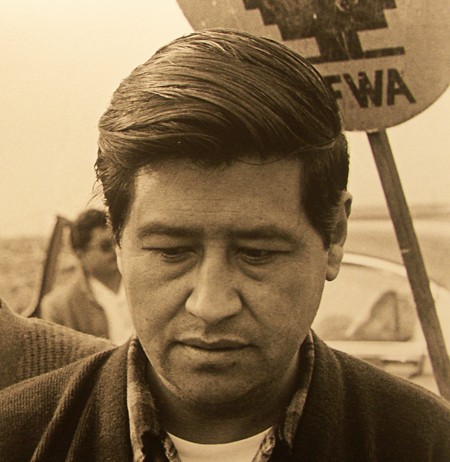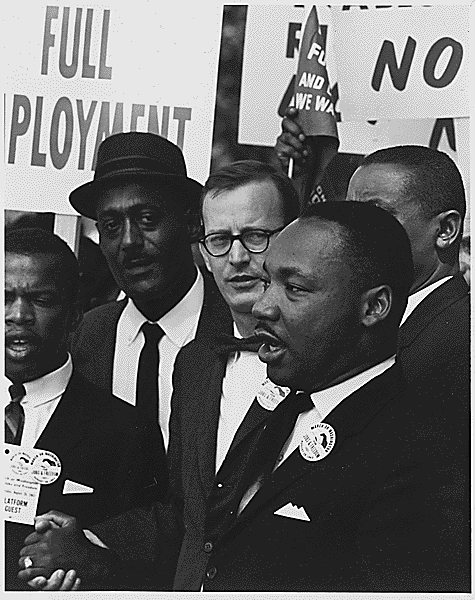By Jose Calderon
 Many of my students, particularly those who came here as immigrants to this country or who were farm workers in the fields, can identify with Cesar Chavez.
Many of my students, particularly those who came here as immigrants to this country or who were farm workers in the fields, can identify with Cesar Chavez.
They identify with how Cesar’s views on nonviolence and morality were influenced by his mother and his grandmother. They identify with his struggles with racism in his school years when the Anglo children called him “dirty Mexican.” Others identify with the story of how the Chavez Family was stopped by immigration officials when they came to California from Arizona in the 1930’s on the suspicion that they were undocumented immigrants.
Today, we identify with Cesar’s life of fighting racism in all its forms and his consistent practice of building multi-racial coalitions to fight injustice. We identify with his resistance to injustice through the use of the boycott, the march, the fast, and community based organizing, strategies that he used to build the United Farm Worker’s Union.
In this context, it is important not to compromise or water down what Cesar Chavez stood for. There is no doubt that Cesar was the leader in helping to institutionalize a movement that is still serving the workers and the community through medical plans, worker pension plans, housing development projects, voter registration drives, and policy-making electoral initiatives.
In recent years, the UFW won a big victory in forcing the governor to sign legislation giving farm laborers the right of mandatory mediation in contract negotiations. This is unprecedented for the farm workers – since the passage of the 1975 agricultural labor relations law. This was done through marches, pickets, fasts, lobbying, voter registration, and vigils at the Governor’s mansion. These strategies followed the examples of Cesar, who like Martin Luther King, Rosa Parks, Dolores Huerta, and so many others, stood for peace, justice, and equality.
If Cesar were here, I know that he would have stood up to condemn the irresponsible acts of war and taking of civil liberties that have occurred in this country and abroad since September 11th. I am sure that he would have felt compassion for the many soldiers who, like a friend of mine who died on the front lines, were merely following orders and often serving as fodder for the monopoly games of greedy leaders and multinational corporations interested only in the quality of profit and not necessarily in the quality of life. If Cesar were here, I know that he would be concerned about what is happening to our economy when billions are being spent in Afghanistan, when there are massive cutbacks in programs that affect the lives of the poor and working classes in this country, and when the blame for the economic problems, once again, are being placed on the backs of undocumented immigrants.
There is no doubt that, alongside Dolores Huerta, when Cesar was alive, he lobbied against federal guest worker programs and spearheaded legislation granting amnesty for farm workers.
If Cesar were here – he would be doing exactly what the UFW has been doing in fighting for the AgJobs bill 645) which would allow an estimated 500,000 undocumented farm workers to earn the legal right to stay in this country and work in agriculture. He would be supporting the DREAM Act which addresses the tragedy of young people who grew up in the U. S. and who have graduated from U. S. high schools but who, because of current immigration laws, have no mechanism for obtaining in-state tuition in the institutions of higher education and who have no way of obtaining legal residency.
There can be no better gift to the memory of Cesar Chavez than to continue the legacy of “service to the community” but, at the same time, ensuring that this service is equally helping to advance organizing efforts for human rights, immigrant legalization, and peace. There can be no better gift to the legacy of Cesar Chavez than to use our lives to advance a world with peace, equality, and justice for humanity. These are the flowers that we will take with us for our annual Cesar Chavez Breakfast on March 30th (between 8 A. M. and 10 A. M.) at The Avalon at the Fairplex (1101 West McKinnely Ave.) in Pomona; a “Dining Hall in the Streets” action on March 30 at 12 noon to protest Pomona College’s firing of 16 immigrant dining hall workers who were trying to form a union (beginning with a march from Shelton Park – corner of Harvard Ave. and Bonita Ave and ending with speakers, music by Quetzal, and a meal in the streets on College Ave. between 4th st. & 6th st.); and a pilgrimage walk on April 2 (beginning at 3 PM with a small fiesta at Garey High School – 321 Lexington Ave. – and a march to Pomona city hall – 505 S. Garey Ave. at 4:30 PM).



